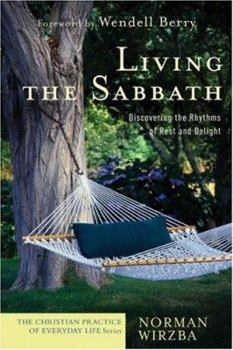Living the Sabbath: Discovering the Rhythms of Rest and Delight
Select Format
Select Condition 
Book Overview
Sabbath is one day a week when we should rest from our otherwise harried lives, right? In Living the Sabbath , Norman Wirzba leads us to a much more holistic and rewarding understanding of... This description may be from another edition of this product.
Format:Paperback
Language:English
ISBN:1587431653
ISBN13:9781587431654
Release Date:December 2006
Publisher:Brazos Press
Length:176 Pages
Weight:0.55 lbs.
Dimensions:0.5" x 6.1" x 8.9"
Customer Reviews
2 ratings
Thoughtful Contribution, Important Topic
Published by Thriftbooks.com User , 15 years ago
I have enjoyed, and learned from, several of Wirzba's essays dealing with agrarian philosophy, and I also found to be very helpful and challenging his previous book The Paradise of God: Renewing Religion in an Ecological Age , so I have been looking forward to reading this new one. I haven't been disappointed. It is both insightful and challenging. The sort of book that should be read carefully by anybody who cares and is willing to think about what it could mean to live a life that is nourished by "rhythms of rest and delight".
We need practices that can lift us out of our narrowness and alienation
Published by Thriftbooks.com User , 16 years ago
For most of us, if we are at all concerned with "keeping Sabbath," it is because of and in terms of the Commandment given to Moses: "Remember the Sabbath day to keep it holy." We set aside one day out of seven to worship and rest. But in LIVING THE SABBATH, Dr. Norman Wirzba digs deeper into the meaning and intent of the biblical concept of Sabbath as introduced in the Genesis creation account. In an early chapter titled "The Meaning of the Sabbath, Wirzba introduces the Hebrew word menuha, "the rest, tranquility, serenity, and peace of God." (Think of the deep peace of shalom.) "Menuha, not humanity, completes creation. God's rest or shabbat...is not simply a cessation from activity but rather the lifting up and celebration of everything." In that context, Sabbath, "the climax of creation, is thus the goal toward which all our living should move." It is more than a one-day interlude. It is an attitude "suffusing every moment with the potential for peace and joy." It is delighting in the gifts of God. "The experience of delight is what the Sabbath is all about." It is seeing and valuing the sanctity of all creation --- this in opposition to exploiting our land, our food supply, our energy sources, our time, our fellow travelers. Wendell Berry, who wrote the book's foreword, plays heavily in Wirzba's scenario, as does Abraham Joshua Heschel. A warning: Part 1 of the book ("Setting a Sabbath Context") is theoretical and theological. It defines terms ("The Meaning of the Sabbath"; "The Practice of Delight"). It explains our errant ways ("The Decline of Delight"). An introductory chapter titled "Losing Our Way" goes into some detail of what is wrong with the "current state of food production." It addresses the problem of evil ("Pain and Suffering"). These initial chapters may be boring if not mind-numbing to the average or recreational reader. Having said that, Part 1 lays the ground work for Part 2 ("The Sabbath in Practical Context"), which is engaging and practical --- much easier to read. Though there is still snow on the ground, it makes me eager to go out and plant radish and spinach seeds in my tiny border garden. It makes me resolve to buy locally grown seasonal vegetables at the nearby farmer's market even if they are no bargain. It reminds me of the delight --- even if tinged with frustration --- of working alongside other church members on a group project. It makes a case for the "family meal" and family meal preparation --- moments and rituals that engender relationships and community. Some of Wirzba's suggestions or conclusions may seem unrealistic, pushing toward utopian, but his book challenges me and makes me feel hopeful, seeing that even small changes in my life can paradoxically both cause and be the result of my delighting in God and in God's creation and Christ's redemption. Wirzba concludes: "In a time of consumerist individualism, often empty of generosity and deep delight, we need practices that can lift us out of our




